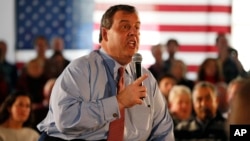New Jersey Governor Chris Christie wanted to be the one selecting a running mate for the 2016 presidential election.
But in a crowded Republican field, Christie struggled to stand out, finishing 10th in the Iowa caucuses and sixth in the New Hampshire primaries. After those poor showings in contests that are so important in generating momentum in the nomination process, he dropped out of the race.
Unlike fellow failed candidates, like Jeb Bush, who continued to oppose eventual nominee Donald Trump after leaving the race, Christie instead quickly endorsed him. The governor joined Trump at campaign events and signed on to lead his presidential transition team. The two men have been friends for more than a decade.
Former President George W. Bush appointed Christie as a federal prosecutor in 2001, a job he held until running for and winning election as governor in 2009.
As a Republican in a state generally considered liberal, the 53-year-old Christie gained a reputation for working with the Democratic-led legislature to pass bills. He was in office when a massive storm wrecked the New Jersey coast in 2012 and set aside usual political concerns and embraced President Barack Obama during a visit to survey the damage.
Christie was considered as a potential vice presidential choice for Mitt Romney when he ran against Obama in 2012. He was not selected, but was given the honor of delivering the keynote address at the Republican convention where Romney officially accepted the party's nomination.
Christie easily won re-election in 2013, but his administration came under criticism that same year for a scandal involving a massive traffic jam on a bridge leading from New Jersey into New York City. Members of his staff ordered several lanes of the bridge closed in apparent retaliation for the mayor of the city of Fort Lee not supporting Christie's re-election bid. Christie denied having anything to do with the closures.
